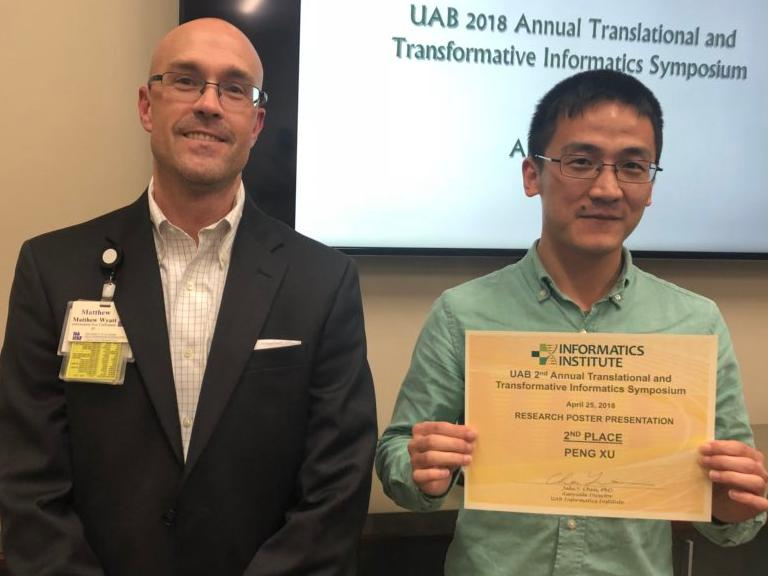 Congrats to ATTIS Poster Competition winners Weida Tan (1st place), Darshan Chandrasheker and Peng Xu (2nd place tie).
Congrats to ATTIS Poster Competition winners Weida Tan (1st place), Darshan Chandrasheker and Peng Xu (2nd place tie).
The day-long ATTIS 2018 on April 25th connected attendees from across the CCTS Partner Network to the broad array of informatics initiatives transforming biomedical data into knowledge at UAB and beyond and introduced the next generation of translational researchers to the latest informatics tools, terminologies, and techniques.
Officially “sold out,” ATTIS 2018 drew more than 100 attendees (including 20 participating online) with its full-day program. Dr. Jake Chen, Professor of Genetics and Computer Science, Associate Director and Chief Bioinformatics Officer at the UAB Informatics Institute, kicked off the meeting. He defined the meeting as a venue for CCTS researchers, professionals, and trainees to jointly work toward the goal of two Ts: “empowering translational research today and transforming healthcare tomorrow.”
Presenters represented a broad array of disciplines in addition to clinical informatics and bioinformatics to cover interdisciplinary fields such as medicine, genetics, genomics, nursing, pediatrics, computer science, biostatistics, molecular and cellular pathology, pharmacology, toxicology, microbiology, infectious diseases, and health professions. Experts from government, academic, and community organizations, including National Cancer Institute (NCI), Vulcan Materials, University of Georgia (UGA), and CCTS partners UAB and Louisiana State University School of Medicine, participated.
Dr. Ying Xu, Regents-GRA Eminent Scholar Chair and Professor of Bioinformatics and Computational Biology at UGA, who presented a keynote talk on “Searching for roots of cancer formation and development in the chemistry of cellular acid-base homeostasis.” Four sessions followed, including clinical informatics and clinical research informatics in the morning, with biocomputing and statistical genomics, bioinformatics methods, and applications in translational sciences and precision medicine in the afternoon. A poster session was held during the lunch break, and an educational panel was held towards the end. A post-meeting award and networking reception at the Informatics Institute capped the day.
Twitter-broadcasted talks included Aaron Hall, CEO of Vulcan, discussing how to increase research efficiency with automated software for analyzing large public data sets; Sean Davis, MD, PhD, NCI Staff Scientist, on resources at the NIH Genomic Data Commons; Matt Wyatt on using i2b2 to access clinical data for translational research; Namasivayam Ambalavanan, MD, on using machine learning models to predict clinical changes in premature infants; bioinformatics doctoral trainee Zongliang Yue on WIPER (weighted in-path edge) for ranking biomolecular association networks; Min Gao, PhD, describing the Partnered Advancement of Informatics Research and Support (PAIRS) program; Deann Wallis, PhD, on transcriptomic and proteomic changes in NF1 deficient cells and their relationship to cancer development.
James Willig, MD, MSPH, moderated the education panel consisting of Dr. Yuliang Zheng, Chair of UAB Computer Science Department; Dr. Eta Berner, Director of UAB’s Center for Health Informatics for Patient Safety/Quality; Dr. David Crossman, Bioinformatics Faculty responsible for developing bioinformatics courses and services at the UAB Heflin Center for Genomic Science; biomedical MD/PhD candidate Timothy Kennell; and Chen.
Congratulations to Da Yan, Darshan Shimoga Chandrashekar, and Peng Xu, who received Best Poster Awards. Posters were reviewed by a panel of judges from the ATTIS program committee for their innovation, potential impact, and overall quality.
This year’s event was co-sponsored by CCTS, the Informatics Institute, UAB Department of Pathology, UAB Department of Biochemistry and Molecular Genetics, and the UAB Multidisciplinary Clinical Research Center.

“ATTIS 2018 showcased the potential for expanding informatics expertise at UAB in support of precision medicine and a rapid-learning healthcare system,” Chen said. The UAB Informatics and Precision Medicine Institutes, along with CCTS, MCBIO, and the MidSouth Society for Computational Biology, are organizing a regional bioinformatics conference to explore synergistic opportunities in informatics and precision medicine, which will be held in conjunction with next year’s ATTIS. Mark your calendar now for March 28-30, 2019!
A video of selected ATTIS sessions will be made available on the CCTS YouTube channel soon.